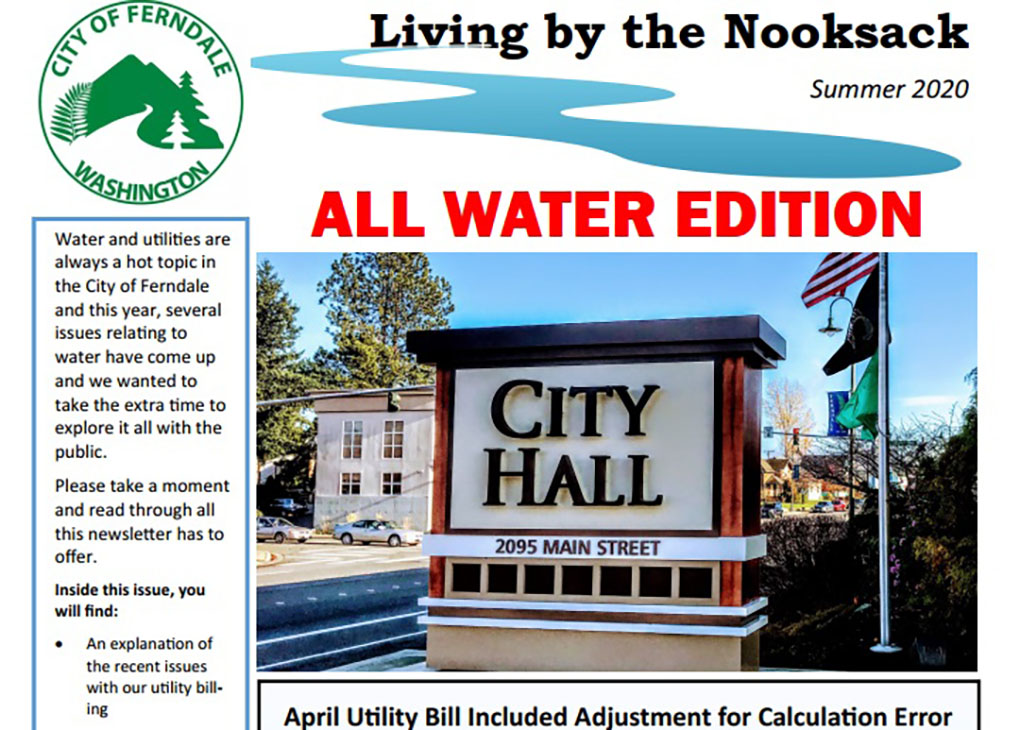
June 30th, 2020 Issue
Click here to download the PDF or scroll down to read the articles.
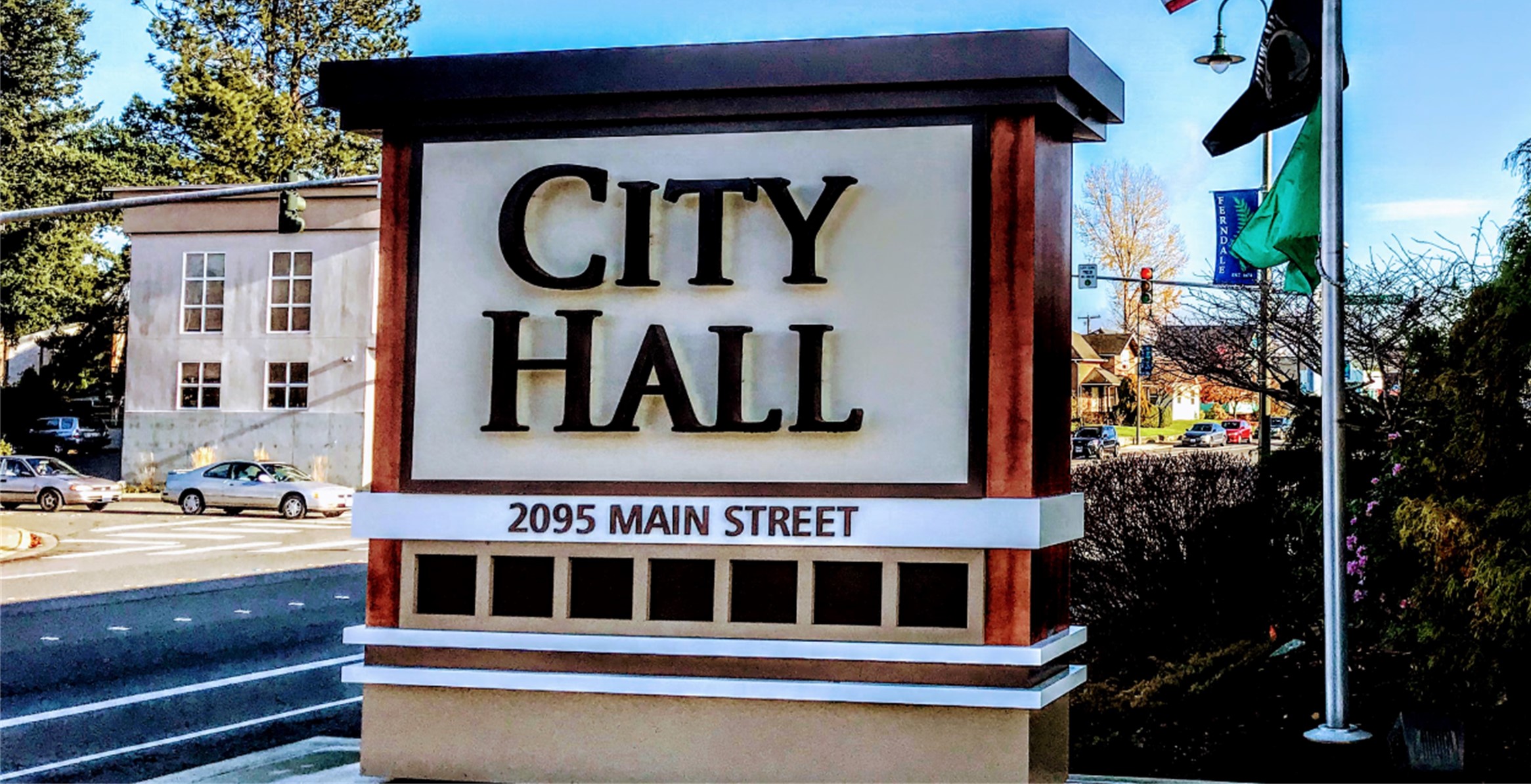
Explanation of Residential Billing Irregularities
Software issues with the Feb. 28th billing cycle resulted in the sewer charges not averaging for approximately half our residential customers. The software did not apply the correct average to the sewer charge which resulted in some bills being higher and some bills being lower in the Feb. 28th billing cycle. The April 30th cycle’s bill included an adjustment, either a credit or an additional charge, to fix that mistake.
Furthermore in the April 30th billing, for those customers who had not paid their Feb. 28th bill, the previous balance was included in the current sewer charges, rather than as a separate outstanding balance line item, which may have given the impression of sewer charges in excess of the use during the billing cycle.
The City would like to formally apologize for how this presented itself on the bills and the confusion or frustration this may have caused. While the billing has been corrected, the City can and will do better at communicating these issues with the public.
The City has determined that the irregularities in billing were primarily associated with the conversion of the City’s billing processes resulting from the 2019 rate study (see page 3). As this conversion has now been completed and combined with additional steps taken to monitor and ensure consistency, the City will provide accurate, reliable billing in subsequent billing cycles. This is the standard the public expects and the City will rise to meet and exceed those expectations.
If you have questions about your specific bill, please contact our utility clerk at (360) 384-4269 or utilitybilling@cityofferndale.org.
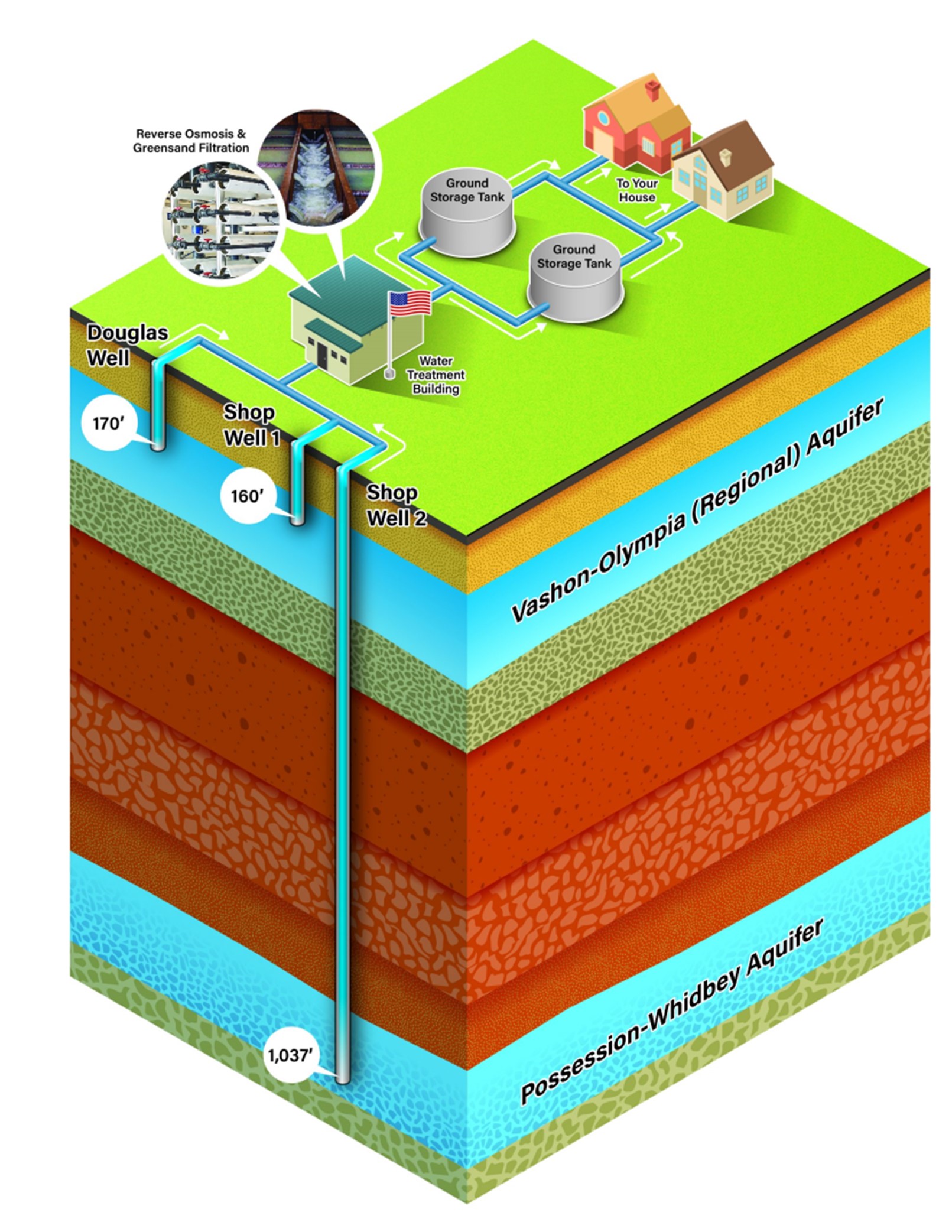
City Brings New Well Online
In 2017, the City began drilling a new well (“Shop Well 2”, in the diagram on the right) to expand the capacity of the city’s water system. Beginning in the summer of 2020, the well is coming online and will begin augmenting the supply.
The new well reaches down over 1,000 feet to access a brand new aquifer. Initially it will provide approximately a quarter of the water needed for the City, but as the expansion of the Water Treatment Facilities (see below) are completed in 2021, the flow from this well can be increased.
This new resource should provide for the City’s needs as we grow and expand into the future.
That said, water is still a precious resource and it is time for our annual water conservation measures. For more details on that, see below.
For more details on the new City well, check out www.cityofferndale.org/newwell
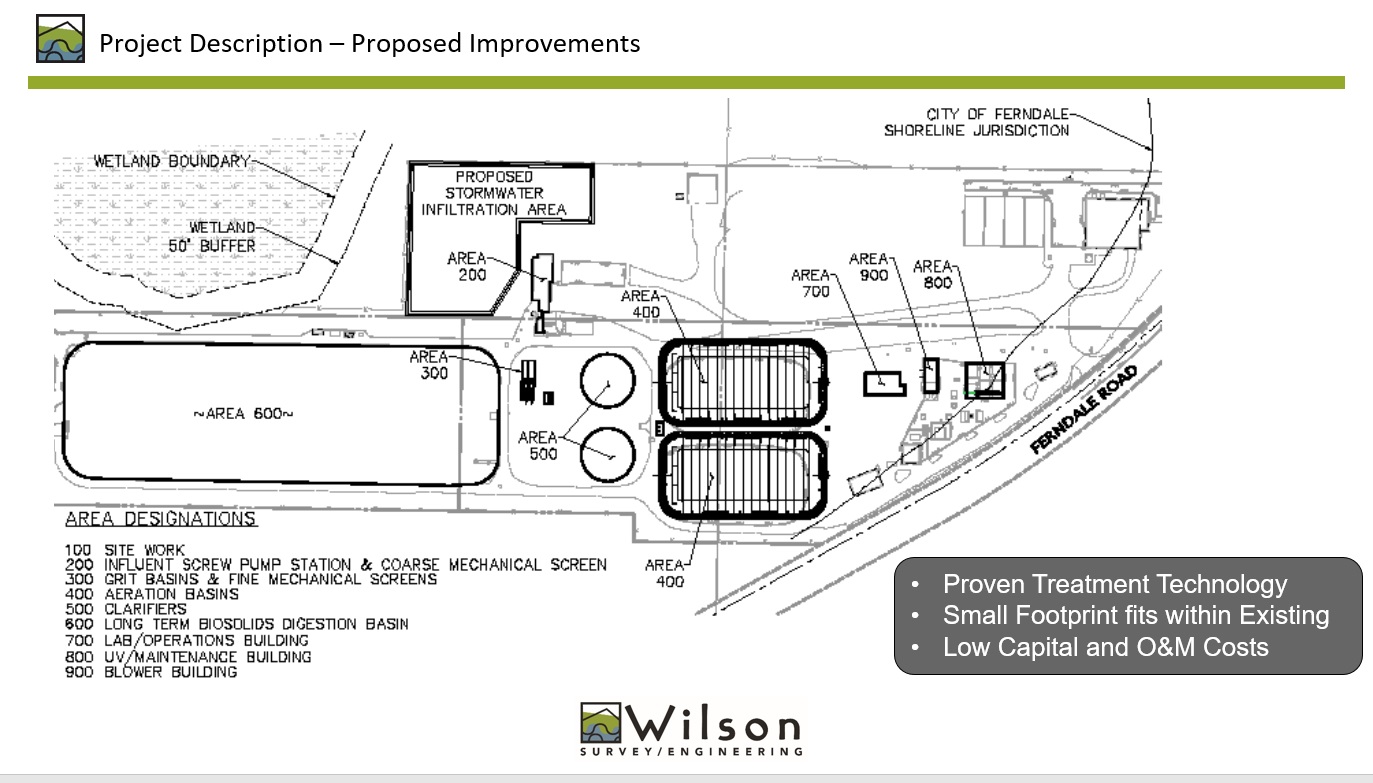
Expanding our Water Treatment Facilities
To better process the new water being added to our system and expand our capacity, the City is upgrading its Water Treatment Plant. The project, set to be completed in 2021, is intended to convert the existing drinking water treatment system to a 100% reverse osmosis treatment system. This is a similar process to what is used by most bottled water companies. The very pure reverse osmosis treated water will be remineralized using calcium carbonate (calcite) so that the water is not too soft and not too hard, similar to the water hardness prior to 2012 when the City utilized water from the Nooksack River.
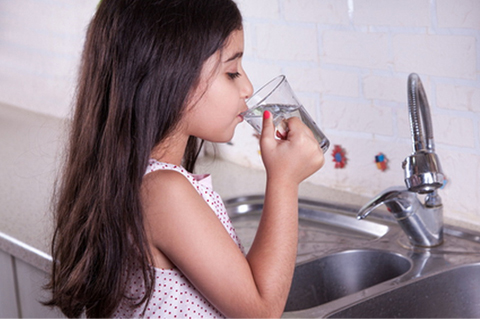
What Does That Mean for the Flavor?
The new well is in a completely separate aquifer than the current supply and will result in some changes to the taste of City water. There are many factors that influence the flavor of City water, not the least of which are your own personal preferences. Throughout this process, our team at the Water Treatment Plant will continue to ensure that the water is safe and reliable. Full water quality reports can be found at www.cityofferndale.org/water

A New Way of Calculating Your Sewer Bill
With rising operating costs and scheduled expansions to the City’s infrastructure, the City conducted a rate study in 2019. This study took a comprehensive look at the utility revenues, costs and billing and
proposed adjustments in rates needed to pay for forecasted changes in expenses in a fair and equitable way.
In December of 2019, after several public meetings, input from community members and discussion with the city council, the new proposed rate structure was passed by the City Council and implemented at the start of 2020.
As part of this restructuring, “sewer averaging” was implemented for residential customers.
This change was implemented based on requests from the community. It ensures that residential customers will not be charged additional sewer consumption for any extra water that goes back into the ground during the summer months (i.e. watering lawns and gardens, sprinklers, filling pools) and provides customers the ability to more accurately budget their bi-monthly utility bills due to the sewer charge consistency throughout the year.
Water, on the other hand, is not averaged but charged for the actual consumption used each billing cycle. Multi-Family (three or more units), Commercial/Industrial, and Irrigation meters are all charged for water and sewer based on actual consumption used.
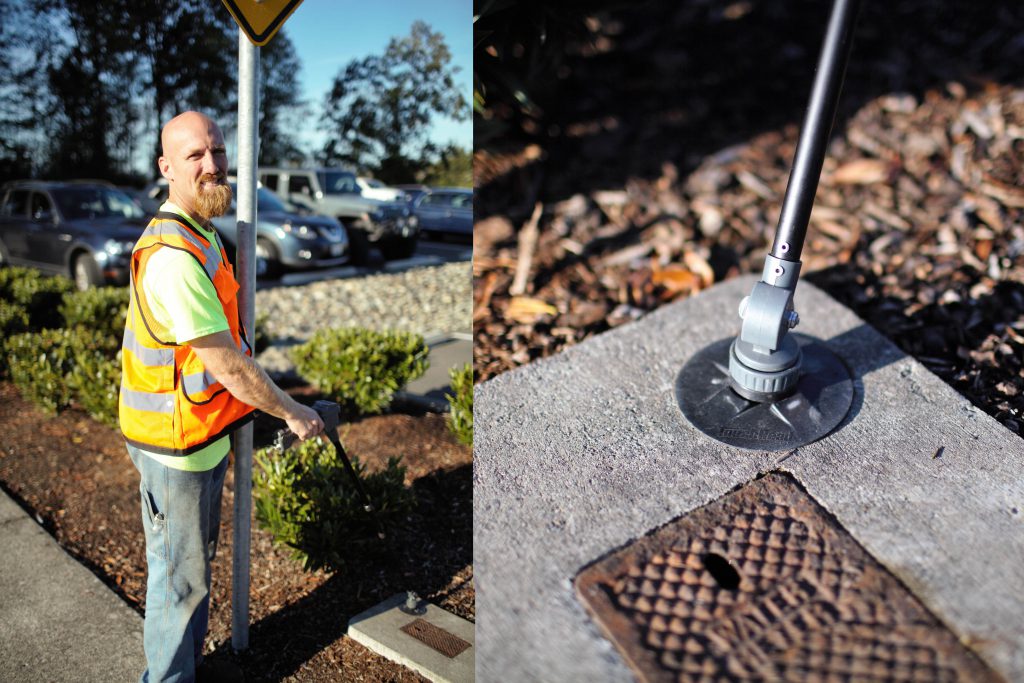
Measuring Your Water Usage
The City uses a handheld touch system to read meters bi-monthly. Every connection to City services includes a meter and a register; they are typically located adjacent to the street, allowing City staff easy access. Public Works Department uses a handheld wand to physically touch the button on top of the meter box. This button transmits the read from the register into the wand, which is automatically entered into a handheld device. These reads are then uploaded into the utility software to prepare for billing.
The City does not estimate consumption for any billing cycle. Inaccurate meter readings are exceedingly rare but can occur. If you believe the meter reading does not reflect your consumption, the City will work with you to investigate the problem. In most cases, higher-than-normal meter readings reflect a leak on the private property.

Utility Bills and COVID-19
Due to the impacts COVID-19 has had on our community and surrounding areas, the City is waiving late fees and suspending service shutoffs for the February 28th and April 30th billing cycles. The City will continue to assess the circumstances surrounding COVID-19 and make a determination regarding future billing fees, as necessary. However, the City is obligated to follow State law which does not allow for balances owing to be waived.
To assist utility customers with their bills, the City provides rate assistance for those who qualify and the ability to make payments without processing fees. Rate Assistance applications can be found on the City’s website here.
Further assistance is available from the Ferndale Community Utilities Fund (see right).
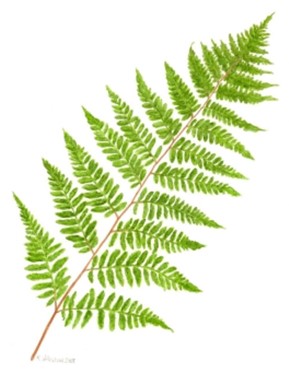
Need Help with your Utility Bill?
In cooperation with the City of Ferndale, the Ferndale Community Service Cooperative is launching the Ferndale Community Utilities Fund.
With the generous support of the community, this fund can cover all or part of an utility bill for Ferndale families who are strapped by lack of work, illness, or other impacts resulting from the COVID-19 crisis. For details, applications or to donate to this fund, go to www.ferndalecsc.org.

Mandatory Water Conservation Measures
To help ensure that everyone has the water they need throughout the dry season, the City is implementing a mandatory water conservation schedule based on street address, and limiting it to the hours of 5pm-10am for a period no longer than 30 minutes. Drip irrigation systems, food-bearing gardens, potted plants, hanging baskets, rain barrels, recreational uses and newly installed landscaping are all exempt from the restrictions.
Following this schedule will help you save money on your water bill, reduce the impact on our environment and help ensure our water system runs strong throughout the season. But that’s not the only way to save water this summer. Here are some other ideas to get you thinking:
4 Tips for Conserving Water
1) Install a rain barrel. Learn how to at www.cityofferndale.org/rainbarrels
2) Spot those leaks! A leaky toilet can mean a big bill. Take the time to find the drip or upgrade the faucet.
3) Gold is the new Green for lawns.
Consider letting your lawn fade to gold, it will return in spring, we promise!
4) Plant native plants. They use less water and fare better in the heat.
